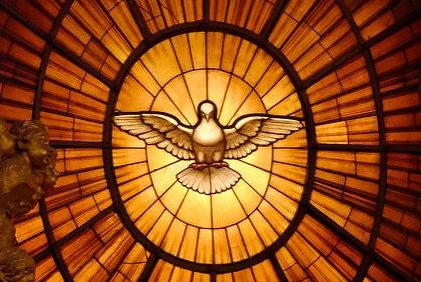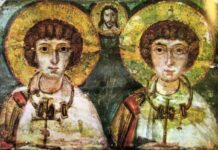Towards a theology in and with the Holy Spirit
(from the Alphonsian Academy blog)
The experience of living according to the spirit of a family, an era, a group or a community is significant and, to a great extent, decisive for our existence. Living within that fundamental breath gives us a sense of belonging and offers us certain assurances. To feel part of a culture, to let its spirit fill our actions and behaviors, tastes, poetry and songs, daily choices that give flavor and meaning to our daily lives, that really is to breathe and let ourselves be carried away by something more than a mere programming or instinctive impulse. Thus, we make the experience of realizing ourselves in and with that element, which is not easily conceptualized, since it is something that is simply perceived, lived, its presence and attraction is felt, its taste is enjoyed, its strength is valued and its identity charge is celebrated. We could give it thousands of names, which would explain a lot, although much more would escape us from such classifications, because the experience is more overwhelming than the precision of the concepts.
Something like this has happened with the Holy Spirit, that great forgotten/unknown, who however has never been certainly absent. What has happened is that His presence has always been overflowing and uncomfortable, resulting in a presence that at times became an absence or disfigurement of what it really was. The Holy Spirit has always been “in the theology”, His presence was so evident in the Bible that it was not easy to leave it completely silent. Named and figurative, with several very different concepts and images. It is interesting because it goes from the most interior and immaterial, to the most external and profoundly concrete. If the Father and the Son are identified with more personal categories, fatherhood/affiliation, the third is given, precisely, the identity of a personal dimension: communion. But all this gave him presence without perhaps giving him an authentic voice, without allowing him to go beyond concept and image; perhaps because the other two (Father/Son) were more immediately representative. However, it must be recognized that in general the three persons have often remained diffuse behind the concept of “God”, expressed in this way, without more, saying synthetically much although hiding much more.
But it is good to recognize that not few times throughout the history of Christianity, in all its versions, there has also been a “theology of the Holy Spirit”, there has been reflection on Him, there has been an attempt to give Him an identity and mission within the Trinity and the economy of salvation, in the great treatises, in the iconography and in the liturgy. His presence is surprising; without him, without that third presence and dimension, the whole scaffolding would collapse. But synthetically one could say that it was more “functional” than real. To make it clear, it is like the third part of the creed, where it is proclaimed “we believe in the Holy Spirit”, but where the later statements have had greater relevance, at least in practice and in the way of approaching the same theology.
It is to the credit of all the theological and vital enrichment of the past century up to the present that these two types of approach to the Holy Spirit have been deepened and better directed. Even though there is still much to be done. We do not have the space here to name many theologians who make this possible. But we are of the opinion that the dynamic of living and reflecting the Christian faith “in and with the Holy Spirit” should continue to be deepened, that is, in and with the strength, the depth, the softness, the subtlety, the permeability, the freedom, the communion, the creative, liberating and sanctifying flight, the deep penetration of all things, the creativity always open to new horizons. The purpose of the Spirit is nothing more than to make room for the love of communion in the heart of human history, therefore, to allow the realization of the kingdom of God in that history. Life in and with the Spirit is dynamic and creative, it actualizes the depositum fidei in the dynamic realization of existence, by continuing the project of new humanity of the God-Father/Mother, a project revealed in Jesus Christ.
The faith aroused in the experience of living in and with the Spirit is nothing other than the same freedom that leads to the development of a creative morality (as a new style of life), at the service of the realization of God’s project. The place par excellence of this reality is, without doubt, the human conscience (cf. GS, n.16). The action of the Spirit through the strengthening of conscience allows human beings to determine themselves as such through choices and concrete actions. The Spirit in the heart of history and consciousness is presented as community love, it becomes a love that seeks to unite and reintegrate all humanity, together with the whole ecosystem, with God the Father/Mother, that is, with communion in diversity. A theology that assumes all that we have briefly presented will be a theology that listens, receives and discerns the signs of the times, in dialogue with the ever-living Word of God; it will be an intercultural, inter-religious and ecumenical theology; it will be a theology of and from experience, and therefore narrative, proactive and performative.
We dedicate these pilgrim reflections to the great brother and theologian Yves Marie-Joseph Congar (1904-1995) 25 years after his passing away, since he was one of those who introduced us more into this dynamic of the Spirit, into the life and reflection of theology in our Churches. And in his homage, we would like to end with some provocative words from another brother in the ecumenical faith, I.D. Zizioulas (1931): “Do we all accept that the Spirit is constitutive of the Church and that, as such, He points to the ontological priority and the ultimacy of the person in existence? Are we prepared to allow this truth to affect our ecclesial institutions, our ethics, our spirituality… in a decisive way?
Fr. Antonio Gerardo Fidalgo C.Ss.R.
Rome, 24-05-202
The original is in Spanish







